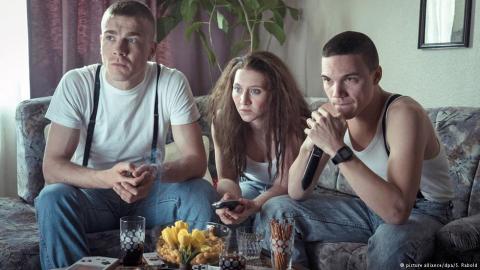NSU drama falls flat with German TV viewers
A still from the TV miniseries shows actors portraying Beate Zschäpe sitting between Uwe Mundlos and Uwe Böhnhardt watching a television report on a murder.
By Carolyn Yeager from media reports
AFTER THREE YEARS of trying to prosecute Beate Zschäpe for her participation in 10 racially-motivated murders that occurred between 2000 and 2009, the German state is losing the interest of the public they are trying to influence.
The trial is so ponderous and slow-moving that there is little for the newspapers to write about, and indeed the readers are not interested in it anyway. This week a much-hyped television miniseries on the alleged crimes and their aftermath met with low viewership. The ratings were poorer than any other thriller, drama or comedy aired by public broadcaster ARD in prime time for the last 10 years – less than 3 million viewers watched any one of the three parts, according to Deutsche Welle.
The DW opinion writer contrasted this with the 10 to 15 million viewers attracted to the US-made “Holocaust” miniseries that was broadcast in West Germany in 1978. One could justifiably say that Germans are weary of having their noses rubbed in their own alleged guilt over non-German minorities. No people has been more obliging of wearing the sack-cloth and ashes in response to the world's condemnation of their character.
The “Holocaust” broadcast is considered by the media-political class in Germany as a milestone for what they call German remembrance. It is said to be the first time the wider German public openly discussed the “crimes of the Nazis.” And why not, as this was true of the entire Western world. It's said, and I personally experienced it myself, that this miniseries began "Holocaust awareness" in average people and set the stage for the onslaught to follow. The next year the Bundestag lifted the statute of limitations on murder, for the express purpose of prosecuting supposed “Nazi war criminals” who were still living in or could be extradicted to Germany. This has had a devastating effect on German justice as we see with today's prosecutions of men and women in their nineties, solely because they happened to work at a concentration camp (for example as a bookkeeper or medic) in 1944.
The “Holocaust” miniseries was fiction, and so is this latest guilt trip which was titled "Mitten in Deutschland: NSU" [In the middle of Germany: NSU]. Though the trial is ongoing and no verdicts have been handed down, the miniseries ficionalized some sort of a conclusion in Part 3 that hasn't yet happened. Altogether the film combined fictional characters and events with scenes meant to be seen as fact. The journalist covering the trial for Der Spiegel complains the film interferes with the ongoing court proceedings and also ignores the presumption of innocence that Beate Zschäpe is due.
Well, we know that a lot of what goes on in postwar Germany shouldn't be allowed, but their law is different in that it excludes democratic rights to anything having to do with the National-Socialist period. The public is fully wise to this, so it's understandable they are not taken in. The good Germans, the simple folk, may say little but, as always in their history, they know the truth of their own people and keep their personal counsel accordingly.
Category
Immigration, NSU trial, Race- 468 reads










